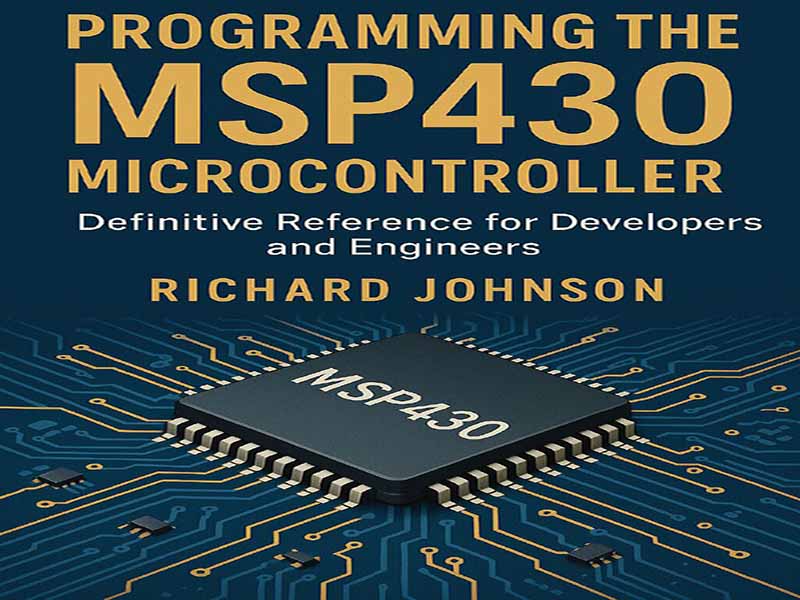- عنوان کتاب: Programming the MSP430 Microcontroller -Definitive Reference for Developers and Engineers
- نویسنده: Richard Johnson
- حوزه: برنامه نویسی میکروکنترلر
- سال انتشار: 2025
- تعداد صفحه: 185
- زبان اصلی: انگلیسی
- نوع فایل: pdf
- حجم فایل: 1.99 مگابایت
سری میکروکنترلر MSP430 یک پلتفرم قدرتمند و همهکاره است که برای سیستمهای تعبیهشده که نیاز به مصرف برق کم، زمانبندی دقیق و ادغام انعطافپذیر محیطی دارند، طراحی شده است. این کتاب، کاوشی جامع و روشمند در برنامهنویسی معماری MSP430 ارائه میدهد و به اصول بنیادی و تکنیکهای پیشرفته ضروری برای تسلط بر این خانواده میکروکنترلر که به طور گسترده پذیرفته شدهاند، میپردازد. این اثر با بررسی عمیق معماری میکروکنترلر MSP430، بینشهای دقیقی در مورد اجزای اصلی که عملکرد آن را تعریف میکنند، ارائه میدهد. مباحث شامل تغییرات در انواع MSP430، فایل رجیستر و مجموعه دستورالعملهای هسته CPU، سازماندهی حافظه، طراحی ورودی/خروجی دیجیتال، مکانیسمهای مدیریت ساعت و توان و سیستم وقفه پیچیده است. درک این عناصر، زمینهساز توسعه و بهینهسازی مؤثر در برنامههای تعبیهشده است. این کتاب با فراتر رفتن از معماری، گردش کار و ابزارهای زنجیرهای توسعه MSP430 را به طور کامل پوشش میدهد. این کتاب، راهاندازی محیطهای توسعه یکپارچه استاندارد صنعتی، فرآیندهای کامپایل متقابل، ساختاردهی پروژه، رابطهای اشکالزدایی و تکنیکهای استقرار میانافزار را تشریح میکند. تأکید بر ساخت سیستمها و تست واحد، تضمین میکند که خوانندگان دانش عملی برای حفظ قابلیت اطمینان و کارایی در طول چرخه عمر توسعه را کسب کنند. برنامهنویسی جاسازیشده C و اسمبلی، هسته توسعه میانافزار در MSP430 را تشکیل میدهند. این متن به ساختارهای کدگذاری با عملکرد حیاتی، ادغام اسمبلی در کد C، رویههای مقداردهی اولیه سیستم و استراتژیهایی برای پیادهسازی روالهای سرویس وقفه بهینه میپردازد. مباحث، دستکاری مستقیم رجیستر را با لایههای انتزاعی سختافزار سطح بالا مقایسه میکند و توسعهدهندگان را قادر میسازد تا رویکردهای مناسبی را برای محدودیتهای برنامه و اهداف عملکرد خود انتخاب کنند. رابطهای جانبی به طور جامع بررسی میشوند و تبدیل آنالوگ به دیجیتال و دیجیتال به آنالوگ، ماژولهای تایمر و مدولاسیون پهنای پالس، پروتکلهای ارتباطی استاندارد مانند UART، SPI و I2C، استفاده از کنترلکننده DMA و الگوهای ادغام حسگر رایج را پوشش میدهند. این تمرکز، پزشکان را به توانایی مهار مؤثر لوازم جانبی روی تراشه برای تحقق سیستمهای تعبیهشده پیچیده و پاسخگو مجهز میکند. تکنیکهای پیشرفته ورودی/خروجی دیجیتال، زمانبندی و آمادهسازی سیگنال به طور گسترده مورد بررسی قرار میگیرند، از جمله ضبط رویداد، فیلتر کردن سیگنال، زمانبندی دقیق، تشخیص لبه و ادغام ساعتهای زمان واقعی. ملاحظات مربوط به جداسازی، تغییر سطح و طراحی ورودی/خروجی آگاه از توان، تعامل استراتژیهای سختافزار و میانافزار لازم برای عملکرد قوی و کممصرف سیستم را نشان میدهد. طراحی کممصرف و بهینهسازی انرژی، جنبههای حیاتی توسعه سیستم تعبیهشده با میکروکنترلرهای MSP430 را نشان میدهند. این اثر به تجزیه و تحلیل دقیق حالتهای توان، مدیریت توان در زمان اجرا، ملاحظات مربوط به برداشت باتری و انرژی، تنظیم پویای کلاک و ولتاژ و پروفایل توان در سطح سیستم میپردازد. این تکنیکها طراحان را قادر میسازد تا ضمن حفظ الزامات عملکردی و زمانی، مصرف انرژی را به حداقل برسانند. معماری میانافزار قوی و اصول طراحی سیستم بلادرنگ ارائه شده است که شامل سازماندهی کد ماژولار، روشهای چندوظیفگی، پیادهسازی ماشین حالت، کنترل همزمانی، محدودیتهای بلادرنگ و تحمل خطا میشود. این مباحث با تأکید بر قابلیت اطمینان و قابلیت نگهداری، متخصصان را برای توسعه میانافزار که شرایط دشوار برنامههای تعبیهشده را برآورده میکند، آماده میکند. امنیت، قابلیت اطمینان و ملاحظات تولید، جزء حیاتی دامنه کتاب را تشکیل میدهند. مباحث شامل استحکام میانافزار، بهروزرسانی امن و طراحی بوتلودر، حفاظت از مالکیت معنوی، یکپارچگی دادهها، رعایت استانداردهای سازگاری الکترومغناطیسی و ایمنی و اتوماسیون برنامهنویسی تولید است. این موضوعات، مهندسان را برای ارائه محصولات ایمن و قابل اعتماد آماده برای استقرار در مقیاس بزرگ، مجهز میکند. در نهایت، مطالعات موردی و کاربردهای پیشرفته، کاربرد عملی مفاهیم برنامهنویسی MSP430 را در حوزههای متنوعی مانند کنترل فرآیند صنعتی، شبکههای حسگر بیسیم، دستگاههای پزشکی و پوشیدنی، دروازههای اینترنت اشیا و سیستمهای میانافزار چندتصویری نشان میدهد. ادغام با کتابخانههای منبع باز و ابزارهای شخص ثالث نیز مورد بررسی قرار گرفته است و مسیرهایی را برای گسترش قابلیتهای MSP430 در محیطهای تعبیهشده مدرن در اختیار خوانندگان قرار میدهد. این کتاب به عنوان یک منبع دقیق و معتبر برای مهندسان، توسعهدهندگان و محققانی که به دنبال تعمیق درک خود از برنامهنویسی میکروکنترلر MSP430 هستند، عمل میکند. خوانندگان از طریق تعادلی از بینش معماری، راهنمایی عملی زنجیره ابزار، تکنیکهای برنامهنویسی دقیق و بحث کاربردی، مجهز به طراحی، توسعه و استقرار راهحلهای تعبیهشدهای هستند که به طور کامل از نقاط قوت خانواده MSP430 بهره میبرند.
The MSP430 microcontroller series represents a powerful and versatile platform tailored for embedded systems requiring low power consumption, precise timing, and flexible peripheral integration. This book delivers a comprehensive and methodical exploration of programming the MSP430 architecture, addressing both fundamental principles and advanced techniques essential to mastering this widely adopted microcontroller family. Beginning with an in-depth examination of the MSP430 microcontroller architecture, this work provides detailed insights into the core components that define its operation. Topics include the variations across MSP430 variants, the CPU core’s register file and instruction set, memory organization, digital input/output design, clock and power management mechanisms, and the intricate interrupt system. Understanding these elements lays the critical groundwork for effective development and optimization in embedded applications. Progressing beyond architecture, the book thoroughly covers the MSP430 development workflow and toolchains. It outlines the setup of industrystandard integrated development environments, cross-compilation processes, project structuring, debugging interfaces, and firmware deployment techniques. Emphasis on build systems and unit testing ensures readers gain practical knowledge for maintaining reliability and efficiency throughout the development lifecycle. Embedded C and assembly programming form the core of firmware development on the MSP430. This text addresses performance-critical coding constructs, integration of assembly within C code, system initialization procedures, and strategies for implementing optimized interrupt service routines. Discussions compare direct register manipulation with high-level hardware abstraction layers, empowering developers to choose appropriate approaches for their application constraints and performance goals. Peripheral interfacing is explored comprehensively, covering analog-todigital and digital-to-analog conversion, timer and pulse-width modulation modules, standard communication protocols such as UART, SPI, and I2C, DMA controller utilization, and common sensor integration patterns. This focus equips practitioners with the capability to effectively harness on-chip peripherals to realize sophisticated, responsive embedded systems. Advanced digital input/output, timing, and signal conditioning techniques are treated extensively, including event capture, signal filtering, precision timing, edge detection, and integration of real-time clocks. Considerations for isolation, level shifting, and power-aware I/O design illustrate the interplay of hardware and firmware strategies necessary for robust and energy-efficient system operation. Low power design and energy optimization represent critical aspects of embedded system development with MSP430 microcontrollers. This work delves into detailed analysis of power modes, runtime power management, battery and energy harvesting considerations, dynamic adjustment of clocking and voltage, and system-level power profiling. These techniques enable designers to minimize energy consumption while maintaining functional and temporal requirements. Robust firmware architecture and real-time system design principles are presented, covering modular code organization, multitasking methods, state machine implementation, concurrency control, real-time constraints, and fault tolerance. With an emphasis on reliability and maintainability, these topics prepare professionals to develop firmware that meets the demanding conditions of embedded applications. Security, reliability, and production considerations form a vital component of the book’s scope. Topics include firmware robustness, secure update and bootloader design, intellectual property protection, data integrity, compliance with electromagnetic compatibility and safety standards, and production programming automation. These subjects equip engineers to deliver secure and dependable products ready for deployment at scale. Finally, case studies and advanced applications illustrate the practical application of MSP430 programming concepts in diverse domains such as industrial process control, wireless sensor networks, medical and wearable devices, Internet of Things gateways, and multi-image firmware systems. Integration with open-source libraries and third-party tools is also addressed, providing readers with pathways to extend MSP430 capabilities in modern embedded environments. This book serves as a detailed and authoritative resource for engineers, developers, and researchers seeking to deepen their understanding of MSP430 microcontroller programming. Through a balance of architectural insight, practical toolchain guidance, rigorous programming techniques, and application-oriented discussion, readers are equipped to design, develop, and deploy embedded solutions that fully leverage the strengths of the MSP430 family.
این کتاب را میتوانید از لینک زیر بصورت رایگان دانلود کنید:
Download: Programming the MSP430 Microcontroller




































نظرات کاربران